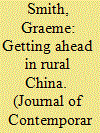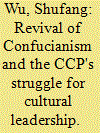| Srl | Item |
| 1 |
ID:
139259


|
|
|
|
|
| Summary/Abstract |
This article will outline the politics and pathways of promotion among government officials working in a rural county in Anhui province and their attitudes towards elite status. It will analyze the implications these processes and pathways have for the operation of local government in rural China. Drawing on interviews and relationships spanning a ten-year period (2004–2013), this article primarily relies upon the personal experiences of colleagues and friends who have attempted to rise through the ranks of government and business in Benghai County, with varying degrees of success. While the article will focus on political elites, in Benghai it is impossible to separate business from politics. This article will delineate strategies adopted for career advancement and attaining elite political status, and the effects these strategies have on the relationship between political elites and ordinary cadres.
|
|
|
|
|
|
|
|
|
|
|
|
|
|
|
|
| 2 |
ID:
133818


|
|
|
|
|
| Publication |
2014.
|
| Summary/Abstract |
The revival of Confucianism in the first decade of the twenty-first century is a political phenomenon that cannot be ignored with regard to its social influence and the particular meaning it has brought to China. However, so far, there has not been much academic research into the political reasons for this revival at a deeper level. Based on the 228 articles published in the People's Daily in the years between 2000 and 2009, a content analysis is conducted on how Confucianism was represented in this authoritative official medium. The examination of the role that Confucianism plays in the construction of the socialist 'advanced culture' provides a clear lens to observe the role of Confucianism in the Chinese political ideology, which is still rooted and based on Marxism-Leninism. This research is aimed at clarifying how Confucianism was pragmatically promoted by the government of the Chinese Communist Party (CCP) with the purpose of securing its cultural leadership. This state-led promotion reveals the vulnerability of the political status of Confucianism in contemporary China and its unsecured future.
|
|
|
|
|
|
|
|
|
|
|
|
|
|
|
|
| 3 |
ID:
089684


|
|
|
|
|
| Publication |
2009.
|
| Summary/Abstract |
Japan's international standing rested almost exclusively on a narrow base of economic power. For the past four decades, it has been the second-largest economy in the world, yet Japan's political or military status has not since World War II been commensurate with its economic power. Today, Japan's global profile and international influence is diminishing even further.
|
|
|
|
|
|
|
|
|
|
|
|
|
|
|
|